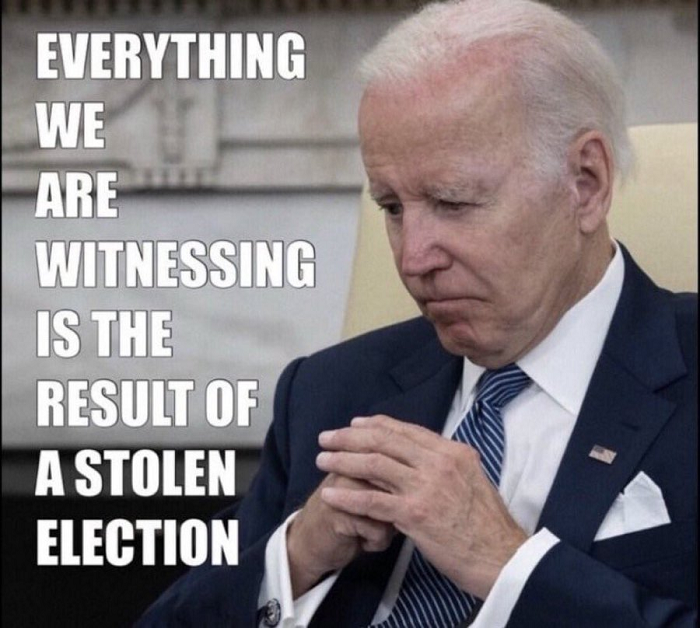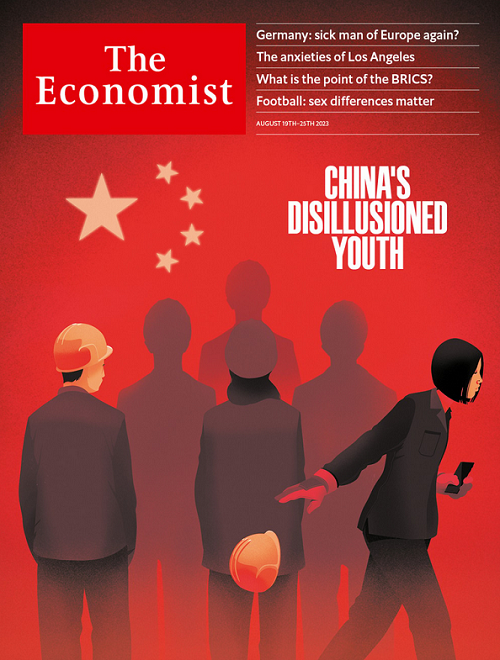HALF-FULL REPORT 08/25/23

We can’t afford to get depressed about this disgusting week, with this dirtbag free in the White House and the man he stole it from arrested in the corrupt county at the core of the theft. That the dirtbag isn’t under arrest instead of his innocent victim shows that justice is dying in America.
Yet there is a very big difference – explained Miracle Max in The Princess Bride – between mostly dead and all dead. Be pessimistic when something’s all-dead. Be optimistic even when something’s mostly-dead and what you’re interested in is not problems in themselves but solutions to them.
On Wednesday (8/23), Greg Jarrett at Fox explained the Three Reasons Why Joe And Hunter Biden Got Away With Their Great Sell-Out Of America – they’re very skilled at corruption, at hiding the cash, and getting both the media and deep state to protect them. Got it. Now what? Well, that same day (8/23), see the NY Post cover story:
It’s written by our friend, constitutional law professor Jonathan Turley: Joe Biden’s Ukraine Defense Falls Apart. State Department memos now reveal that Biden extorted the Ukraine government to fire its attorney general because he was investigating Burisma’s bribery of him and his son.
And this morning (8/25), the Daily Mail is reporting on the Ukraine attorney general that Biden got fired, Viktor Shokin: Fired Ukrainian Prosecutor Shokin Says Joe And Hunter Biden DID Take BRIBES – And Were Behind His Ousting: ‘Isn’t That Corruption Alone?’ He Says.
This is clear grounds for House impeachment, which Turley now advocates and Speaker McCarthy close to promising. Yesterday (8/24), former Assistant U.S. Attorney Andy McCarthy explained that lengthy and thorough impeachment hearings and investigations would last throughout the spring and early summer purposefully in tandem with PDJT’s kangaroo court trials.
It would be a brilliant showcasing of the real evidence of Biden Crime Family corruption contrasting the lack of evidence regarding Trump.
So – from now on, this is what to always bear in mind:
By the way… wasn’t there some kind of chaotic shout-a-thon between seven guys and one gal on Wednesday?
One of them was a smooth-talking kid whose hubris is only matched by his ignorance of world leaders and what motivates them. The lady’s criticism of him was devastating. Another was a guy who could have prevented those two graphics above but didn’t. There was a fat guy who got booed. A moderator claimed “China has the biggest navy in the world” – that’s impossibly stupid.
Cheers for the Florida fellow who said he’d send the Delta Force into Mexico to wipe out the cartel drug labs, and use lethal force against the “foreign terrorist” cartels crossing our border. And for the fat guy who said “Of course” all the illegals have to be deported back to where they came from. And for the kid who said “The head of the snake, the Department of Education” has to be eliminated completely.
There were smart things, dumb things, and churlish things all around. You can read the transcript here.
Yeah, I heard about that… trouble is, the Main Event was somewhere else with over 200 million views watching that instead. You can watch Tucker and Trump here. The Daily Mail literally sums it up: 13 Million Americans Tuned In For Cable Network’s First Republican Debate, While Tucker Carlson’s X Interview With Donald Trump Gets 238 Million ‘Views’ … And Counting.
Bottom line: Narcissism prevails among many of those Debate Eight, purely so among those with no chance on the ticket (Pence, Christie, Hutchinson, Bergum). The others are either going for it if Trump falters, or auditioning for VP (RDS & Scott the former, Vivek & Haley the latter).
Vivek may poll-surge due to his articulate novelty, but that will fade. No serious nominee will want a 30-something kid on his ticket – but a cabinet position definitely, as long as it’s light years from anything on foreign policy. Secretary of Education to oversee its extinction!
I personally remain hopeful that the ticket will be Trump/DeSantis. Note that Tucker’s interview was at Trump’s Bedminster Country Club in New Jersey. The 12th Amendment prevents presidential and vice-presidential nominees being from the same state – but Trump relocating to New Jersey would solve that. It’s really the best ticket given the reality that Dem Indictment Persecution is locking it in for El Donaldo.
************
One clear indication of that is after his depraved arrest in Fulton County, he was back on X/Twitter posting his mug shot which got 169 million views within hours.
Even more – also within hours, the Trump 2024 Campaign began selling his mugshot t-shirts, coffee cups, bumper stickers, and signed posters. How awesomely cool is that? Can’t top that for a middle finger salute to the Dem Corruption Machine.
Whatever possessed that Trump-hating Fulton County Sheriff to take an arrestee mugshot better than any portrait studio that will go down in history as the greatest mind-blow mugshot ever taken? Here it is with the official watermark:
PR and marketing aside, the London Economist recently ran a thorough analysis of the Trump 2024 campaign: The Meticulous, Ruthless Preparations For A Second Trump Term.
It’s a subscribers-only piece, but it’s important enough for you to see it entire. So as a public service, it’s addended to this HFR below. It’s 3,000 words with British writing, but worth a scan to be aware of how PDJT and his people are very seriously preparing and organizing.
************
Here’s some welcome news. BlackRock, the world’s largest asset manager with just under $9 Trillion under management, is abandoning climate alarmism and ESG/DEI investing. This is a huge hit on eco-fascism. On Wednesday (8/23): Blackrock Turns Down Record Number Of Climate Proposals Amid Inflation, ESG Pushback.
************
And here’s a word every GOP candidate for office from PDJT on down needs to know and advocate: Schuldenbremse. Say it with me: Schuldenbremse. It means “Debt Brake” in German. It’s in the German Constitution. The brake is on government deficit spending.
It specifies by federal law that overall German government debt cannot exceed 60% of GDP. The US is now at 118% ($27T GDP, $32T Debt). Further, Schuldenbremse limits the annual federal budget deficit to 0.35% of the GDP. That would limit our federal deficit spending this year to less than $100 billion – instead of the $1.5 trillion it is now.
We need a Schuldenbremse Debt Brake on Washington spending – and no one should vote for anyone running for president (or senate or house) who doesn’t say so.
************
Here’s something bizarre. Did you have any idea that there are 750,000 Ethiopians living in Saudi Arabia, 400,000 of them illegally? Neither did I until I saw this report on Tuesday (8/22): Human Rights Watch Accuses Saudi Arabia of Massacring Migrants at the Border.
But wait… it turns out that the Iran-backed Houthi insurgents of Yemen are far more brutal than the Saudis trying to protect their border. Looks like the Saudis got tired of Human Rights Watch extorting them for bribes not to write damning reports, and this is HRW’s payback.
************
You may have heard of something called BRICS that’s having a confab in South Africa (the “S”). The “R” is Russia but Putin didn’t show, too afraid of being bumped off. The others who did show: Brazil’s Lula, India’s Modi, and China’s Xi. Peter Zeihan described it best:
I can only concur. Hard to think of a dumber list of added countries announced as “historic” by Xi in Johannesburg: Iran, Saudi Arabia, Egypt, Argentina, the UAE and Ethiopia. Wow, real powerhouse economies to challenge the Dollar as the world’s trading currency. Dumber than, well, bricks.
************
The story inside is China’s Defeated Youth. It’s really grim, far, far worse than our GenZers. You wonder – will there be a Chinese Oliver Anthony? But all of China is going this way. Tomorrow (8/26), the cover story will be this follow-up:
The Wall Street Journal has come to the same conclusion. Sunday (8/20): China’s 40-Year Boom Is Over. What Comes Next?
“For decades, China powered its economy by investing in factories, skyscrapers and roads. The model sparked an extraordinary period of growth that lifted China out of poverty and turned it into a global giant whose export prowess washed across the globe.
Now the model is broken.
What worked when China was playing catch-up makes less sense now that the country is drowning in debt and running out of things to build. Parts of China are saddled with under-used bridges and airports. Millions of apartments are unoccupied. Returns on investment have sharply declined.”
So has Issues & Insights today (8/25): The ‘China Century’ Is Over, due to China’s “doom loop of debt accumulation, population shrinkage and a productivity slowdown” – plus Xi’s totalitarianism.
With Putin’s Russia being a world pariah due to his invasion of Ukraine, Xi is not going to be another world pariah (with catastrophic economic consequences) by invading Taiwan. No, just about the only “What’s next?” answer is ignite nationalistic Han jingoism for the recapture of China’s Outer Manchuria provinces stolen by Russia over 160 years ago (see Chinese Siberia in TTP).
Not a chance of Xi being a pariah over that. Who would come to Russia’s aid? Belarus? Eritrea? Nobody.
************
Yesterday, there were celebrations of Ukraine’s Independence Day – August 24 – not just throughout Ukraine but in capitals and cities all over the world.
And there were memorials to this little girl, six year-old Sophia, along with so many others.
She was murdered in cold blood in a horrifying Russian missile attack on the city center of Chernihiv on Saturday (Aug 19).
https://www.youtube.com/watch?v=rbPUBREuCrM
Let me be clear. Anyone on the side of Putin in this war is an accessory to Sophia’s murder. Slava Ukraini.
************
Now let’s turn to the opposite of this, something life-affirming. Skye yesterday talked of the vital value of Vitamin D3, and the terrible cost of its deficiency. He noted he, and I along with Rebel, take 8,000 IU/200mcg a day.
So let’s talk about a formula that dramatically increases your chances of living longer. It’s a Pearson & Shaw formula produced by TTPers Greg & Michelle Pryor of Life Priority – called AGEless.
AGEs, Advanced Glycation End Products, are gook at the end of our metabolism that accumulate with age causing all sorts of deadly malfunctions – like kidney failure and much else. This formula is designed to flush those gooky critters out of your system.
No, this is not an ad, I nor TTP get anything from this. I just vouch for it as I take all the ingredients you see. Feel free to contact Greg & Michelle at [email protected] to ask them about it. They’re always happy to talk to fellow TTPers!
************
Okay, Folks, that’s a wrap. Rebel and I leave soon for our Heart of Central Asia Expedition. For the next month, the HFR will be ably helmed by Mike Ryan. Mike’s HFRs always raise the bar on me, and I’m sure that’s just what he’ll do next month.
But I won’t be gone – I’ll be sending periodic dispatches from what 19th century explorers called The Back of Beyond. You’ll be hearing from me there. Blue skies to you all!
*******
Addendum
The Meticulous, Ruthless Preparations For A Second Trump Term
The Economist, July 13, 2023
BROOKE ROLLINS is sitting at her desk in Fort Worth, Texas, at the back of an anonymous, low-rise building. It looks uncannily like an office in the White House, with its lemony cream wallpaper, dark wood furniture and photographs of the president signing bills as admirers look on. Only one detail jars: the 18th-century rifle leaning against the wall.
The resemblance is not a coincidence. Mrs Rollins worked in the White House under Donald Trump and briefly ran his Domestic Policy Council. She purchased her West Wing furniture when she left. Towards the end of Mr Trump’s first term, she was in charge of putting together a policy agenda for his second one. After Mr Trump lost his bid for re-election in 2020, she set up a think-tank to continue that work, the America First Policy Institute (AFPI).
AFPI aspires to be an administration-in-waiting. Its staff of 172 includes eight former cabinet secretaries from the Trump administration and 20 other political appointees. “I will leave things ready for the next Republican president,” Mrs Rollins says.
Campaign-finance laws prevent her from saying so, but she means Mr Trump.
AFPI is the newest think-tank preparing for a second term for Mr Trump, but it is not the biggest. The Heritage Foundation, which prides itself on having done the preparatory work for Ronald Reagan’s “revolution”, has its own presidential transition project. This is led by Paul Dans, a lawyer who worked in the White House’s Office of Personnel Management during Mr Trump’s presidency.
In 1981 copies of a manual for government produced by Heritage were placed on the chairs of each of Reagan’s cabinet members before their first meeting. Heritage is updating that idea, co-ordinating an effort by 350 conservative wonks and former administration officials to write a plan for government in time for the Republican primaries next year. Those who have criticised Mr Trump or his agenda will not be part of it.
As well as drafting policies for each department, Mr Dans and his colleagues are building a list of potential recruits to serve in the next Republican administration. He likes to describe the effort as a conservative LinkedIn. Fully staffing an administration requires about 4,000 political appointees, 1,200 of whom must be approved by the Senate. Heritage and its allied think-tanks are vetting the people to fill those jobs now.
Dismiss that which insults
What would prove disqualifying? “If you kind of have shown yourself to have fought against the Trump administration, or there are issues where you’ve actually been counter to it,” says Mr Dans. “You know where people stand by where they sit, so to speak. Their postings and social media, their allegiances over time can give people a pretty good picture.” Blaming Mr Trump for the ransacking of the Capitol in 2021, or supporting his impeachment in the days that followed, for example, would be enough to keep someone off the list.
Thanks to these efforts, the next Trump administration, if there is one, will have fleshed-out plans and the know-how to advance them. That would make it very different from Mr Trump’s first term. “We didn’t have the people because nobody thought we would win,” says Steve Bannon, who managed Mr Trump’s campaign and was an influential figure at the beginning of his presidency. (Mr Trump fired Mr Bannon, but later stopped him being tried for misuse of funds from a non-profit group he headed by pardoning him.)
Mr Bannon mentions the National Security Council (NSC) as an example of the staffing problems the Trump administration faced. It struggled to come up with half the necessary number of political appointees, he says. They were an odd mixture of people like Michael Anton, a corporate PR man and apocalyptic political commentator, and old foreign-policy hands who turned out to be queasy about Mr Trump’s courting of North Korea’s dictator and his hostility to American allies.
What was true of the NSC applies to other agencies, too. “You have got to hit the beach with three or four thousand guys,” Mr Bannon says. Mr Dans agrees. “In Hollywood they like to describe things as ‘this meets that meets the other’. This is the Manhattan Project meets the Empire State Building meets D-Day.”
The initial objective for this invading force is to capture the civil service. One lesson that Mr Trump’s backers drew from his first term is that no policy matters more than control of the bureaucracy, because no policies can be implemented without it.
To that end Mr Trump’s commandos will “deconstruct” the administrative state—the 300 or more federal offices that issue and interpret regulations. The philosophical version of this idea is that, over time, as the role of the federal government has grown from fighting wars and running the postal service into the Leviathan it is today, unelected bureaucrats have assumed powers that should belong to Congress.
The Twitter version is that the deep-state liberals who thwarted Mr Trump when he was in office and have persecuted him since he left must be vanquished. Either way, Mr Trump’s shock troops will try to wrest power back from the bureaucracy.
In practice it is hard to see how government would function without the administrative state. Congress struggles to fulfil basic responsibilities like passing a budget on time. To imagine that the same body could act as, say, the regulator of financial markets is a stretch. That may be the point. The MAGA movement is not libertarian, but in many ways it would like the federal government to do far less than it does now.
The would-be Trump appointees plan to subdue the bureaucracy using Schedule F, shorthand for an executive order issued by Mr Trump in 2020 and rescinded by Joe Biden when he became president. It reflects a view that the federal bureaucracy, whatever its size, should not have any entrenched authority.
For the first century of its existence, civil servants were appointed to jobs by the government of the day based on an algorithm of personal contacts and favours owed known as the spoils system. Then in 1881 a deranged office-seeker assassinated the president, spurring the passage of the Pendleton Act, which created a class of professional bureaucrats who stayed in their posts even as the presidency changed hands. Since the 1940s, when Franklin Roosevelt was expanding the government, it has been hard to fire federal bureaucrats, AFPI complains.
Many political appointees in the Trump administration believe that a minority of civil servants used their protected status to thwart or undermine the president’s wishes. James Sherk, a policy adviser in the Trump White House who is now at AFPI, cites two cases on which lawyers in various government departments reportedly refused to work: one against Yale University for allegedly discriminating against Asian-Americans, and one aimed at protecting nurses from having to perform abortions. Schedule F would empower Mr Trump’s appointees to remove perceived obstructionists at will.
“Schedule F is now, I think, Republican doctrine,” says Russell Vought, who ran the Office of Management and Budget under Mr Trump. “I don’t know how a Republican gets elected and doesn’t do that.” It would also be straightforward to enact: Mr Trump could just reissue his old executive order. Again, there is a reasonable version of this idea, in which a small number of recalcitrant civil servants lose their jobs, and a campaign version, where Schedule F becomes the instrument of Mr Trump’s righteous purge of Washington.
To be with those I like is enough
The combined effect of appointing only loyalists and cowing the bureaucracy would be both to remove constraints on Mr Trump and to ensure his wishes are acted on more often. In his first term Mr Trump’s opponents took some comfort from the idea that not all the people around him were true believers, and were willing to stall his most alarming ideas. The New York Times ran an anonymous piece by a political appointee who claimed there was an internal resistance within the administration that acted as a check on presidential power. In a second Trump term, there will not be any “grown-ups in the room”, as Mr Trump’s detractors called such people.
Once a second Trump administration had bent the bureaucracy to its will, what policies would it pursue? The department-by-department plans being drawn up at AFPI, Heritage and elsewhere give some guidance. They involve some predictable fusillades in the culture wars, such as completing a wall along the border with Mexico and directing all federal officials to consider only people’s biological sex, rather than “self-identified” gender. But some of the putative policy agenda is both more sweeping in scope and more of a break with past Republican orthodoxy.
One such area is the economy. The new right is enthusiastic about the kind of industrial policy the Biden administration has pursued. “No one in Ohio…cares that the Wall Street Journal editorial board doesn’t like the CHIPS bill on free-market economic grounds,” J.D. Vance, a senator, recently told a gathering at American Compass, a think-tank, referring to a law subsidising semiconductor factories.
In some cases Mr Trump’s supporters would go further: Mr Vance advocates taxing companies that shift work offshore.
The main partisan disagreement over industrial policy is no longer whether to have one at all, but over the Democrats’ habit of smuggling diversity requirements and environmental goals into it. As the Republicans have become a more working-class party than the Democrats, people like Mr Vance have tried to synthesise a new Republican position that is both pro-labour and hostile to union leaders. His advocacy of subsidies for industry without “the woke bullshit” is probably more popular than the Biden administration’s approach.
That enthusiasm for an active state coexists with a more conventional Republican programme of lowering taxes, coupled with a belief that well-intentioned efforts to cut poverty usually backfire. AFPI’s policy book talks of making permanent the tax cuts in the Tax Cuts and Jobs Act of 2017, some of which are due to expire in 2025.
AFPI’s policy wonks also advocate attaching work requirements to Medicaid (health insurance for the poor) and other government benefits. In Arkansas, the only state to have implemented work requirements for Medicaid, a quarter of those enrolled in the programme lost their health insurance and there was no noticeable increase in employment. The reforms would at least save some money, but not enough to have much impact on the federal deficit.
Expensive industrial policy, lower taxes and only small reductions in benefits—in other words, less revenue and more spending—would not balance the books, much less trim government debts or refill the funds that pay for Medicare (subsidised health insurance for the disabled and the old) and Social Security (the state pension), which are due to run dry in the early 2030s.
On past evidence the bond market is likely to continue to finance the growing gap between the government’s income and expenditure. Investors might become nervous, however, if the Federal Reserve’s independence were in question. Some Trumpists think it should be, since they do not like to cede so much power to unelected bureaucrats. That is a minority view, Mr Vought concedes, but could gain ground: “I guarantee that if that debate was in front of President Trump, that he wouldn’t just throw you out of the Oval Office.”
Another area in which a second Trump term could bend the arc of history is in environmental policy. In his first term emissions of greenhouse gases kept falling, even though he reversed many of Barack Obama’s policies to slow climate change. Investors assumed that government policy would soon revert to a greener norm and coal-fired power stations have lifespans of several decades, so the administration’s fondness for them was not enough to get new ones built. In this respect, too, a second Trump administration would be more methodical and better organised.
Whatever satisfies the soul is truth
AFPI’s policy book talks about ending “the war on fossil fuels” and makes untethered assumptions about how much bigger the economy would be without it. (AFPI estimates that America’s gdp will be 6% smaller by the end of this decade than it would have been without the Obama administration’s emissions-reductions targets.)
The argument is presented in both pragmatic and moral terms. Why should American oil stay in the ground while Saudi oil flows? And why should the use of fuels which can bring so much prosperity to so many be circumscribed? Never mind that Mr Biden’s administration has granted more permits to drill than Mr Trump’s did, that America is the world’s largest producer of oil or that it is in the national interest to limit global warming.
America Firsters like oil, gas and coal and the relatively well-paid, manly jobs for high-school graduates they bring. They are also opposed to the green transition, which they see as unnecessary government meddling that raises energy prices for ordinary Americans. Both Kevin Roberts, who runs Heritage, and Mrs Rollins, who started AFPI, used to be senior figures at the Texas Public Policy Foundation (TPPF), a think-tank which opposes the development of wind farms and solar plants.
Over a quarter of Texas’s electricity is generated by renewables, and TPPF has helped to propagate the idea that this makes the state’s power grid unstable. Investors in renewables say Texas’s electricity regulator has become hostile to new projects. TPPF, meanwhile, is battling renewables as far afield as New York, Rhode Island and Massachusetts, where it has initiated a lawsuit against a big offshore wind farm on behalf of fishermen.
If the federal Environmental Protection Agency and Justice Department were run by people who shared these instincts, investors in renewables would face the same sort of political risks as owners of coal plants.
A third area which is likely to see great upheaval if Mr Trump becomes president again is foreign policy. Among America First types, there is deep disagreement about Ukraine. AFPI’s policy book talks about facing the threat from Russia. Yet Mr Bannon says, “I don’t give a sh*t about Ukraine—what I give a sh*t about is the invasion of America’s southern border.”
Mr Vought makes the same point in a more wonkish way: “Ukraine is being subsidised by our taxpayers to fight and not make strategic calculations that they would otherwise make if we weren’t subsidising it. And it’s not in our interest to subsidise that conflict.” Mr Trump himself says he would end the war. He may not be able to do that. But Ukraine and its other allies ought to take seriously the possibility that America may no longer be with them in 18 months.
Policy towards China is less contested. The Trump administration was more confrontational towards China than any of its predecessors. The Biden administration has continued in the same vein, albeit with less inflammatory rhetoric and more considered policies. “The difference between the Biden administration and the Trump administration on protectionism is that the Biden administration is competent,” says Dan Drezner of Tufts University. A second Trump term would be more likely to build on what the Biden team have done rather than, say, loosening export controls.
Heritage’s plan for 2025 foresees an immediate ban on TikTok and also on Confucius Institutes. American pension funds would be encouraged to divest from “problematic” Chinese entities. The government should be prepared “to employ punitive policy measures” to prevent American investment in sensitive areas in China and Chinese investment in America. American companies considering large-scale investments in anything deemed critical would have to submit information about counterparties and anticipated use of funds to the US government before investing, “under a presumption of denial”.
Whether Mr Trump would authorise the use of force if China were to invade Taiwan is hard to say. Some who worked in his administration note that whenever they were about to adopt tougher policies on China, the bosses of big American firms would call the White House and tell him that the move would alarm financial markets and he would back down. The same dynamic may apply in a second term. In a memoir of his time as Mr Trump’s national security adviser, John Bolton suggests the former president was not really committed to Taiwan’s security. Others claim he would be “stronger” than Mr Biden.
Other allies could expect the same peremptory treatment as in Mr Trump’s first term. He reportedly told aides he wanted to leave nato. Even AFPI, which on foreign policy is closer to the old Republican orthodoxy, thinks that military support should be withdrawn from countries that do not spend at least 2% of GDP on defence, a level that neither Japan nor most countries in nato meet.
The modern America First movement, like its namesake during the second world war, contains some true isolationists. But it also contains an influential clutch of people like Elbridge Colby, who served in the Department of Defence and believes in a muscular foreign policy. He thinks China is such a threat that America should pull back from its defence commitments in Europe and the Middle East to concentrate on the Pacific.
No matter how well-laid the plans for a second Trump term, nor how thoroughly vetted the people carrying them out, Mr Trump would still be in charge, which means there is a limit to how methodical it could be. But it would be altogether more formidable than the version of 2017-21. As for the candidate himself, he is aware of the plans being made on his behalf but has never been excited by the details of public policy. For the professional wonks in the movement, that is an opportunity.
“The Economist doesn’t think that populists can govern, right?” asks Mr Vought. “We believe we’re trying to be an answer to that viewpoint. So we’re trying to look systemically: how does someone who has an American First perspective, a populist perspective, govern credibly and effectively? Because they know the inner workings of government so well.” The winner of next year’s presidential election will be sworn in in 18 months. The institutions of the new right expect it to be Mr Trump, and this time they will be prepared.














